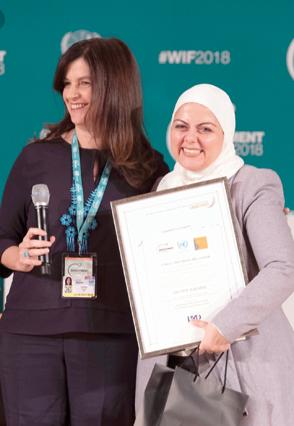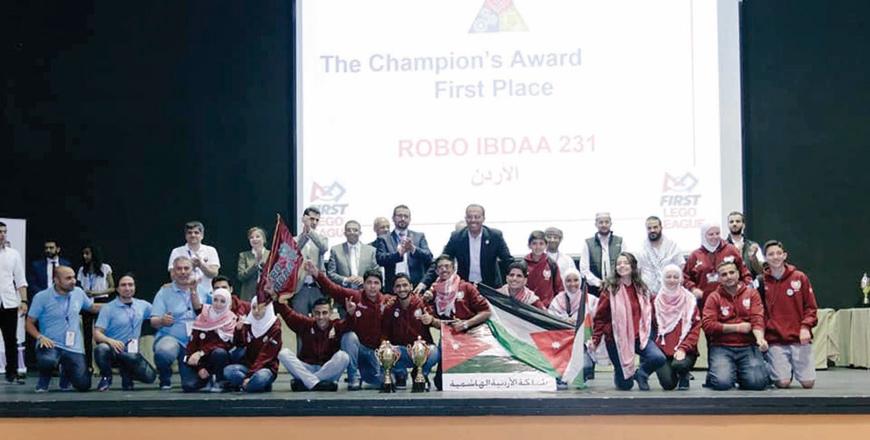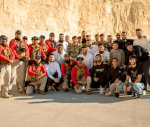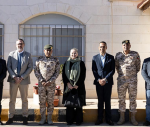You are here
Young minds display ingenious inventions at World Science Forum
By Camille Dupire - Nov 09,2017 - Last updated at Nov 09,2017
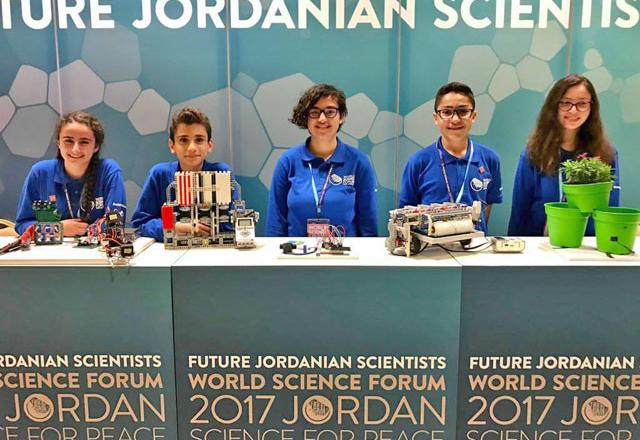
Young students from the International Robotics Academy display their latest inventions at the World Science Forum at the Dead Sea, on Wednesday (Photo by Camille Dupire)
DEAD SEA — “Jordan has a very big water problem, and we all contribute to make it worse. This is why we need solutions to regulate our water use,” said Haneen Abu Hijleh, a 15-year-old student at the Modern Montessori school in Amman.
The young girl is part of a group of students from the International Robotics Academy (IRA), who are displaying their latest inventions at the World Science Forum, held at the Dead Sea between November 7 and 11.
A water leak detection system, Abu Hijleh’s project monitors the leakages by alerting the user of his or her daily over-consumption.
“We often tend to leave the water on, as we wash our hands, brush our teeth, or even sometimes when we forget to turn it off,” the 11th-grader said, adding that she invented a system that calculates the speed of the water going through a valve, which can be attached to any tap in homes or public buildings.
“Not only does it show you how much water you use, it also helps you control it. I installed an alarm that will start ringing as soon as your water consumption reaches the maximum limit. The water will then turn off and you will have to reset it to stop the alarm and resume the flow,” Abu Hijleh explained.
The student said she would like to see her invention implemented in public places like schools, parks, or malls, in order to limit the water waste in a country that already stands as the fourth most water scarce globally, according to the latest figures by the World Resource Institute.
Abu Hijleh, along with Farah Hashem, Ziad Al Sharif and Janette Al Nabulsi are school students aged between 11 and 16 years old, who take part in the IRA after-school programme, that aims to promote the culture of Science, Technology, Engineering and Mathematics (STEM) among young people.
“Children have a different point of view on things, they come up with solutions that adults do not think of because they have a fresh, uncomplicated mind,” said Omar Al Darwish, a research and development coordinator at the IRA.
Hashem, who is a 10th grade student at the Ahliyyah school for girls, developed “Teleport”, a mechanism that aims to help labourers working in dangerous environments to control their machines from a distance.
“Some people have to work around chemicals or toxins, or have to manipulate dangerous material. I created a robotic arm and hand that allow the user to control anything from a distance,” she explained.
The robotic device, which imitates the movement of the user’s hand, can be used from anywhere to perform the action desired without being in contact with the dangerous components.
At the IRA, courses on Artificial Intelligence, robotics, programming and coding, among others, are provided by professional engineers to students aged between 6 and 16.
“As instructors, we guide the children’s ideas towards a viable prototype. Some of them are real geniuses and, through a hands-on approach, they learn how to implement their project,” Darwish, who is a renewable energy engineer himself, told The Jordan Times at the forum.
“It is great for these kids to have the opportunity to participate in such a conference because it gives them a great exposure and experience by talking to international figures from various scientific and business backgrounds,” said Lama Sha’sha’a, co-founder and chairperson of the IRA, adding “I think it helps them build confidence and gives them a push to continue innovating.”
Working in close partnership with various international bodies, the IRA develops interactive STEM modules to “improve the educational process in the MENA region by cooperating with the local industry and young entrepreneurs, providing prototyping services as well as professional technical consultations”, according to its website.
Related Articles
AMMAN — Forty-five-year-old Jordanian entrepreneur Lama Sha’sha’a has been nominated for the 2022 Fortune-US Department of State Global Wome
AMMAN — The Jordanian team "Robo Ibdaa" will represent the Arab world at the international championship First Lego League (FLL) in Houston,
AMMAN — Jordan's teenage "Robo Ibdaa" team has seized the first place in the Robot Mechanical Design Award in this year's First Lego League


